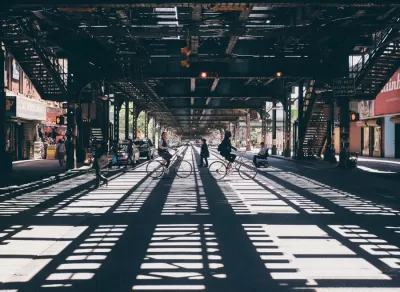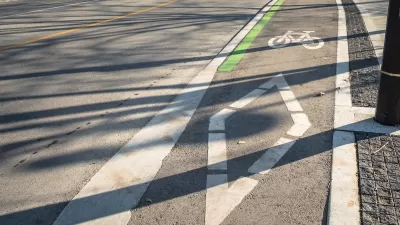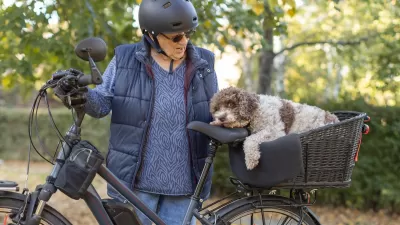Those in search of high-tech solutions for urban congestion and pollution often overlook the bicycle as a powerful, if simple, tool for reducing both and improving urban transportation.

Writing in Next City, Nicolas Collignon argues that it isn’t autonomous or electric vehicles that can change the future of transportation, but rather a much simpler technology: the bicycle. “Sparked by the pandemic, supported by people waking up to the climate crisis and now fuelled by the rising price of oil, we’re living through a bicycle renaissance,” Collignon writes.
Yet a “gap between our imagined future, the promises of techno-kings and the realities of progress” persists. To Collignon, this is in part due to the exciting future visions promised by technologists. But every flying car or delivery robot comes with its own massive set of implications for infrastructure and society. “When we begin to see technology through the lens of systems, it becomes clear that genuine technology-led progress will focus on dealing with the accelerating complexity of today’s world, not increasing the complexity of our tools.”
When it comes to bicycles, Collignon points out that while they are often more efficient and nimble, their very speed and flexibility prevent them from being easily quantified and “optimized” by algorithms. We don’t need to revolutionize the bicycle, “the fastest, most energy efficient, resilient, and lowest carbon emitting urban vehicle,” Collignon writes, but rather change the lens through which we view and organize urban mobility flows.
FULL STORY: Bikes, Not Self Driving Cars, Are The Technological Gateway To Urban Progress

Planetizen Federal Action Tracker
A weekly monitor of how Trump’s orders and actions are impacting planners and planning in America.

Congressman Proposes Bill to Rename DC Metro “Trump Train”
The Make Autorail Great Again Act would withhold federal funding to the system until the Washington Metropolitan Area Transit Authority (WMATA), rebrands as the Washington Metropolitan Authority for Greater Access (WMAGA).

The Simple Legislative Tool Transforming Vacant Downtowns
In California, Michigan and Georgia, an easy win is bringing dollars — and delight — back to city centers.

The States Losing Rural Delivery Rooms at an Alarming Pace
In some states, as few as 9% of rural hospitals still deliver babies. As a result, rising pre-term births, no adequate pre-term care and harrowing close calls are a growing reality.

The Small South Asian Republic Going all in on EVs
Thanks to one simple policy change less than five years ago, 65% of new cars in this Himalayan country are now electric.

DC Backpedals on Bike Lane Protection, Swaps Barriers for Paint
Citing aesthetic concerns, the city is removing the concrete barriers and flexposts that once separated Arizona Avenue cyclists from motor vehicles.
Urban Design for Planners 1: Software Tools
This six-course series explores essential urban design concepts using open source software and equips planners with the tools they need to participate fully in the urban design process.
Planning for Universal Design
Learn the tools for implementing Universal Design in planning regulations.
Smith Gee Studio
City of Charlotte
City of Camden Redevelopment Agency
City of Astoria
Transportation Research & Education Center (TREC) at Portland State University
US High Speed Rail Association
City of Camden Redevelopment Agency
Municipality of Princeton (NJ)





























